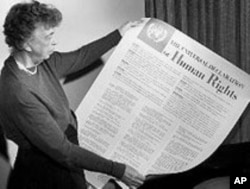U.S. Secretary of State Hillary Clinton opened her remarks at the Eleanor Roosevelt Human Rights Award ceremony by recognizing the brave men and women around the world who are being persecuted, jailed, and tortured.
"Among them," she said, "is Chinese writer, Liu Xiaobo, who has now been awarded this year's Nobel Peace Prize." Liu was not in Oslo to accept the prize because he is serving an eleven year prison sentence on charges "of inciting subversion of state power." Liu was a primary author of Charter 08, which called for peaceful democratic reform and greater respect for human rights in China. The United States has consistently called for Liu Xiaobo's immediate release.
In Cuba, said Secretary Clinton, the women of Damas de Blanco have endured harassment, beatings, and arrests as they march every week in support of their husbands and sons who are longtime political prisoners. In Zimbabwe, activists have been arrested, abducted, or beaten after calling attention to human rights abuses and the plight of the poor.
This year's winners of the Eleanor Roosevelt Human Rights Awards have each contributed to promoting human rights. Honoree Louis Henkins, who died in October, pioneered the study of human rights law as a discipline. He understood the importance of human rights as a Jewish refugee from the Communist Soviet Union.
His wife, Alice Hartman Henkin was also honored for her work as the director of the Justice and Society Program at the Aspen Institute. There she brought together lawyers, business people, and educators to help shape U.S. policies on human rights, international law, and peacekeeping.
Wade Henderson was honored for his advocacy of American civil rights.
The final honoree was Sarah Cleto Rial who came to the United States as a refugee after first fleeing the civil war in Southern Sudan and then Khartoum due to her work in calling attention to wartime atrocities against women. She arrived in the U.S. in 1999 and began working for the non-governmental organization, My Sister's Keeper. They built a school for girls in Southern Sudan and have started programs to train teachers and teach adult women how to read.
Upon accepting her award, Ms. Rial said, "Today as women, we seize our power and we claim our destiny in Sudan and in the world. We will achieve our human rights, and we will build peace in our country and throughout the world."





